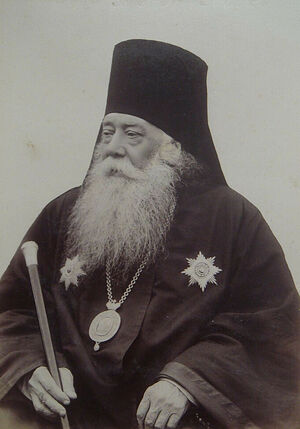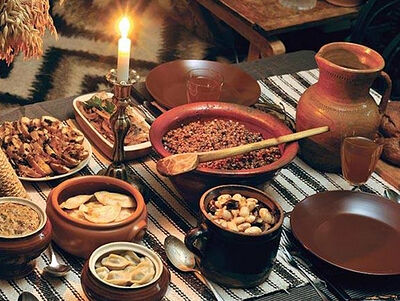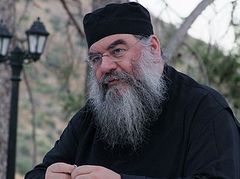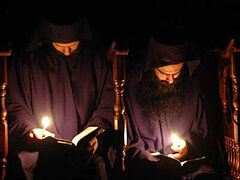 St. Justin of Ufa and Menzelinsk St. Justin of Ufa and Menzelinsk was ordained to the priesthood in September 1853. His wife died in 1862, and he was tonsured into monasticism in June 1863. He served at various monasteries and seminaries, and on January 27, 1885, he was consecrated Bishop of Mikhailovsk, vicar of the Ryazan Diocese. He served in a number of dioceses, and on October 14, 1896, he was appointed Bishop of Ufa and Menzelinsk. He retired in 1900 and spent the rest of his life until his peaceful repose on September 26, 1903, in monastic reclusion. In 1988, he was glorified as a locally venerated saint in the Synaxis of Crimean Saints.
St. Justin of Ufa and Menzelinsk St. Justin of Ufa and Menzelinsk was ordained to the priesthood in September 1853. His wife died in 1862, and he was tonsured into monasticism in June 1863. He served at various monasteries and seminaries, and on January 27, 1885, he was consecrated Bishop of Mikhailovsk, vicar of the Ryazan Diocese. He served in a number of dioceses, and on October 14, 1896, he was appointed Bishop of Ufa and Menzelinsk. He retired in 1900 and spent the rest of his life until his peaceful repose on September 26, 1903, in monastic reclusion. In 1988, he was glorified as a locally venerated saint in the Synaxis of Crimean Saints.
Behold, Great Lent has come, thank God!1 All Christians are now obliged to fast and pray.
As we learn from the Holy Fathers of the Church and from experience, fasting and prayer are the two wings that help a Christian ascend to Heaven; that is, they help him renounce everything sinful and take up abode in the realm of all that is holy. So extraordinarily great is the power of fasting and prayer! But, my beloveds, we can acquire this power with the help of the grace of God if we properly understand the meaning and significance of fasting and prayer and if we practice them as we ought.
Thus, let us begin on these fasting days to give ourselves to an intent study of fasting and prayer; and let us, at the same time, begin to fast and pray in earnest.
On Fasting
1
Fasting is not simply the usual restraint in food and drink prescribed by prudence and medical science, aimed at preserving bodily health; rather, it is a higher degree of temperance, along with the distinction of food and drink—temperance prescribed for the children of the Holy Church for certain fasting days and periods.
Fasting, according to the explanation of the Holy Fathers, was established by God Himself, in Paradise, when the first people, our forefathers, were forbidden to taste of the fruit of the tree of the knowledge of good and evil (Gen. 2:17). We find many examples of fasting in the Old Testament (Num. 29, 1/3 Kg. 7, Ps. 34:13, 1 Macc. 3:47). In the New Testament, the Savior Himself, having come not to abolish but to fulfill the Law, Himself sanctified fasting with His forty-day fast in the desert before He embarked upon His public ministry. In addition to His own example, He also taught fasting by His word, when He told His disciples: Take heed to yourselves, lest at any time your hearts be overcharged with surfeiting, and drunkenness (Lk. 21:34).
What Jesus Christ taught and what He commanded, the Holy Church has always followed unwaveringly. The Acts of the Apostles presents not a few examples of the first Christians’ strict observance of fasting; and the Holy Church has never forgotten fasting since. The Holy Fathers and teachers of the Church have many instructions and decrees on holy fasting. St. Basil the Great speaks directly: “Because we, in the person of our forefathers, did not fast, we were cast out of Paradise. Thus, let us fast in order to enter again into Paradise” (Homily 1 On Fasting).
Therefore, the Holy Church established four fasts in the end, according to the four seasons of the year, as times for common fasting and repentance: two fasts in honor of the Lord Jesus Christ—Great Lent and the Nativity Fast, one in honor of the Mother of God—the Dormition Fast, and one in honor of the descent of the Holy Spirit upon the Apostles—the Apostles’ Fast. We also have one-day fasts on the feast of the Exaltation of the Cross of the Lord and the Beheading of St. John the Forerunner; on Wednesday in remembrance of our Lord Jesus Christ’s betrayal to suffering, and on Friday in remembrance of His very suffering and death. All of the fasts are obligatory for every Christian, as children of the Church, excepting the sick and infirm.
However, unfortunately, there have always been people, and now there are many such people, who abuse the fasts, or reject them altogether, indifferent to the fact that they thereby become disobedient children of the Church that has commanded fasting, incur countless diseases, and are constantly treated and die before their time. How pitiable are such people! They are so foolish and weak that they prefer to get sick and die prematurely than to stop eating something sweet. Oh, children, children!
On the other hand, how many great and sensible fasters the Church of Christ has, both in the Old and New Testaments: there Moses, Elijah, and David; here the Baptist and his countless imitators who all lived long, healthy lives; they lived and committed great deeds. On the Saturday of Cheesefare Week, the Holy Church remembers and glorifies the innumerable host of saints of God of every kind, rank, age, and sex who shone forth in fasting. The Holy Church does this before Great Lent, by the way, in order to give us examples of fasting.
Wherefore seeing we also are compassed about with so great a cloud of witnesses, let us lay aside every weight, and the sin which doth so easily beset us, and let us run with patience the race that is set before us, Looking unto Jesus the author and finisher of our faith; Who for the joy that was set before Him endured the Cross, despising the shame, and is set down at the right hand of the throne of God (Heb. 12:1-2).
Amen.






